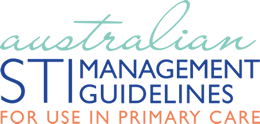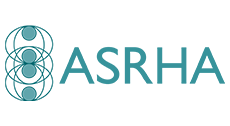Genital herpes simplex virus (HSV)
Overview
- Genital HSV is highly stigmatised and poorly understood in the community
- Patient education to address both clinical and psychosocial concerns is required at time of diagnosis
- Other human herpes viruses can cause genital ulceration (herpes zoster virus [HZV]; Epstein-Barr virus [EBV]). See anogenital ulcer section
- Initial episodes may be severe, and treatment should never be delayed while waiting for a test result
- Most HSV is asymptomatic or mild enough that diagnosis is never sought. If symptoms do appear, it can be days or years after HSV was first acquired
- More than 50% of primary genital infections are caused by HSV 1 in young people.
- Recurrences are more common in the first year with HSV 2
- Severe and frequent recurrences may be treated with continuous suppressive or episodic antivirals
- Herpes simplex viruses types 1 and 2
|
Symptoms |
|
|
Site/specimen |
Test |
Consideration |
|
Swab of base of ulcer or deroofed vesicle |
*HSV NAAT |
Positive – HSV infection *Negative – may not acquired HSV infection – see anogenital ulcers section |
*HSV NAAT – Nucleic Acid Amplification Test; a very sensitive and specific test; it is rare but false positives and false negatives may occur
Self-collection of NAAT specimens at first onset of recurrent symptoms may be useful to confirm diagnosis in patients who have failed to have confirmation when attending clinical services.
Serology: do not screen asymptomatic people with serological tests for HSV types 1 or 2. Use of serology is limited to specific situations where results will provide meaningful clinical information (e.g. an asymptomatic pregnant partner of a newly diagnosed person) and should be done in conjunction with and infectious diseases specialist.
|
Principal treatment options |
||
|
Situation |
Recommended |
Alternative |
|
Initial episode |
Valaciclovir 500mg PO, BD for 5 -10 days |
Aciclovir 400mg PO, TDS for 5 -10 days |
|
Recurrence: episodic therapy Should be self-initiated at the first hint of symptoms |
Valaciclovir 500mg PO, BD for 3 days |
Famciclovir 1g orally twice a day for 1 day or Aciclovir 800mg TDS for 2 days |
|
Recurrence: suppressive therapy |
Valaciclovir 500mg PO, daily for 6 months |
Famciclovir 250mg PO, BD for 6 months or Aciclovir 400mg BD |
|
Suppression in pregnancy (see below for details) |
Valaciclovir 500mg PO, BD from 36 weeks until birth |
Aciclovir 400mg TDS from 36 weeks until birth |
NB – Pharmaceutical Benefits Scheme (PBS) streamline authority scripts required
Other immediate management
- Written information and support (www.herpes.org.nz)
- Regular analgesia
- Topical lignocaine to reduce pain from erosions, fissures and ulcers
- Urinating in a bath or shower relieves superficial dysuria
- Neuropathic bladder requires urgent catheterisation and referral
- Avoid intimate contact with partners until symptoms have resolved
- Routine sexual health screening
- Use of barriers i.e., waterproof dressings.
HSV is not a notifiable disease.
Contact tracing is not recommended, but patients may need support if they wish to disclose to current or future sexual partners.
Treatment advice
- Seek specialist advice regarding patients living with human immunodeficiency virus (HIV) or immunosuppression.
- Treatment should not be delayed for those presenting with moderate-to-severe episodes, particularly initial episodes.
- Initial episodes may require a 10-day course of treatment if symptoms are slow to resolve.
- The ability for the patient to adhere to the recommended dosing frequency should be considered when selecting the appropriate treatment.
- Choice of suppressive therapy, episodic therapy or no therapy depends on clinical features including frequency and severity of recurrences and psychosexual complications of the diagnosis (e.g. fear of transmitting the infection to intimate partners).
- Review the need for suppressive therapy 6 monthly as recurrences usually become less frequent and less severe with time.
- Those with frequent recurrences (e.g. 2 or 3 times per month) or immunosuppression may require higher doses (PBS authority required for increased amount of medication).
- Ongoing symptoms, despite antiviral treatment, should prompt consideration of other causes of genital symptoms (see anogenital ulcer and genital dermatology).
Psychosocial impact of diagnosis
- This can be profound but is often based on misinformation.
- Providing facts about high community prevalence (70%-80% HSV1 and 12-15% HSV2) and largely mild clinical effect is important for reducing stigma.
- Concerns about a current relationship may be addressed with knowledge that transmission can occur from someone unaware they have the infection and symptoms can also occur for the first time some days or years after acquisition.
- Patients should be reassured that there are multiple strategies to avoid transmission to future partners. https://www.herpes.org.nz/herpes-patient-info/living-with-genital-herpes
- Refer to a psychologist for support with patients who are unable to accept the diagnosis, are significantly distressed by the diagnosis, or anxious about having the infection when tested negative.
- Some sexual health services in Australia have counselling services.
Special situations
- Seek specialist advice before treating any complicated presentation.
- Talk to people with HSV about suppressive therapy to reduce transmission to their partner before or during pregnancy.
|
Neonatal transmission may occur in pregnancy, during the delivery or via skin-to-skin transmission in post-natal period (via oro-labial HSV transmission). The greatest risk of sequelae for the baby is when HSV is acquired in the third trimester or close to the time of delivery. Routinely commence HSV suppression from 36 weeks gestation in people who know they have the infection (with or without lesions). Commence at an earlier gestation in people with multiple recurrent lesions during pregnancy. For further information about HSV and pregnancy refer to a sexual health specialist. |
|
|
Allergy to principal treatment choice |
Seek specialist advice. |
Contact tracing is not recommended for HSV infections.
Review a week after commencing treatment for the first time to:
- Undertake evaluation of the response to treatment.
- Complete sexual health testing if unable to do so at time of initial presentation because of severity of symptoms.
- Educate about condom use, contraception, HIV PrEP/PEP, safe injecting practices, consent, CST and vaccinations for HAV, HBV and HPV as indicated.
- Provide further support and information as required.
- Obtain copies of previous results, if possible, if tested at another clinic. Microbiological confirmation of diagnosis (NAAT) is desirable but need not delay treatment.
Test of cure and retesting
Not required.


